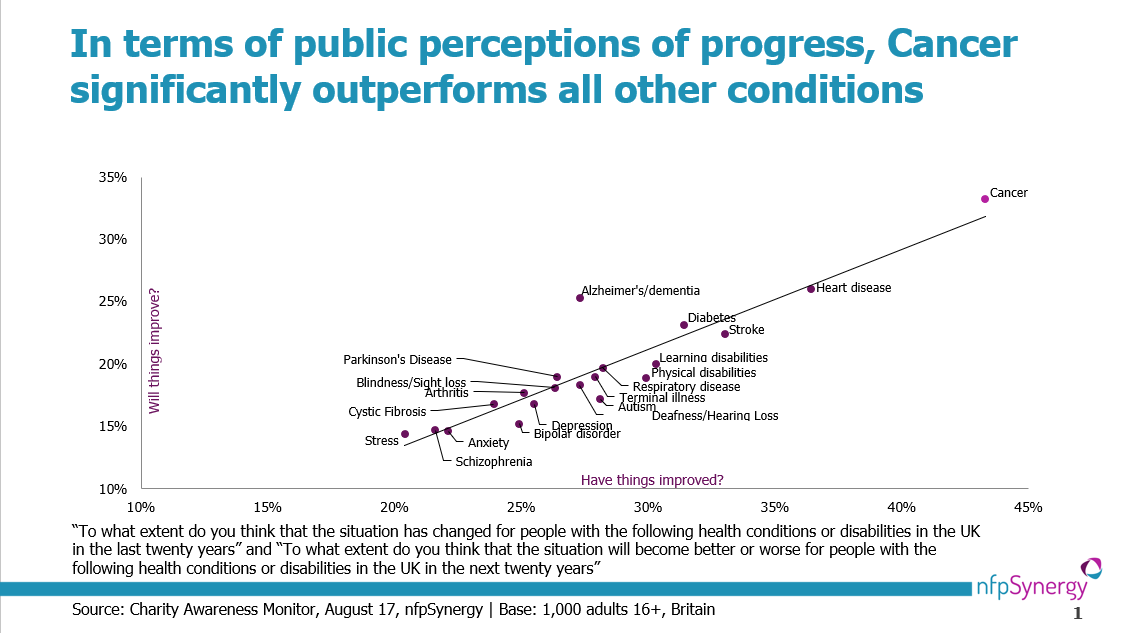When it comes to thinking about the future, we are one of the most pessimistic nations. And not just in Europe – in the entire world.[1] The future of healthcare appears to be particularly gloomy prospect for the Brits – only 8% of us feel optimistic.[2]
This statistic might be more than useless trivia. A growing body of scientific research indicates that being pessimistic might increase health risks, while being optimistic can increase one’s chances of surviving cancer.[3]
But if our attitudes have the potential to affect our wellbeing, is it possible to change the way one feels about the future? So, we asked how the situation had changed for people with specific health conditions and disabilities, ranging from cancer and diabetes to blindness/sight loss and learning disabilities in the last 20 years. And then we asked how they would change in the next 20 years.
We found, not surprisingly, perhaps, that there is a positive correlation between believing in past progress and believing in future improvement. Those who are positive about past improvements in the health and disability sector are more likely to be optimistic for the future. In turn, negative views about the past make it very difficult for the public to believe things will improve in future.
Although this situation might look a bit dim, we argue that it actually presents a great opportunity for charities to play a leading role. What our finding suggests is the importance of sharing the impact and success of the charity.
This is because optimism about treating a health condition – how much or what has gotten better in the last 20 years – is not cultivated simply by advances in medicine and healthcare. When medical achievements are well communicated and systematically reported, we eventually shift our way of thinking about the condition. When we constantly see the progress made we are more likely to believe it is going to improve further in the future.
Although we found no condition for which more than half of the respondents think the situation improved, one came at top: cancer. About 4 in 10 think the situation with cancer improved, and 1 in 3 think it’ll improve in future. Cancer is exceptional in inciting optimism; the runner-up is heart disease, at about 1 in 3 believing it has improved and about 25% thinking it will improve. Somewhere at the back of our mind we know that compared to several years ago, cancer survival rates are up and stroke mortality rate is down.

We may not realise it, but this sense of “doing better” is largely nurtured in us by charities – charities like Cancer Research UK[4], Stroke Association[5] and others. Through their well-organised campaigns health-related charities demonstrated the importance of medical research and general awareness, showed the value of intangible services they provide (like emotional and psychological support) for their beneficiaries. They brought not sadness, but a sense of power to change things for better, ultimately transforming our way of thinking about some difficult health conditions.
Sadly, mental health conditions such as anxiety and stress, all live on the other side of the spectrum, where people found the least progress in the past and were the least optimistic about future improvements.
Expressing optimism about treating health conditions that are not necessarily life-threatening, but chronic and long-term or conditions that have actually worsened is not easy. The Internet is full of negative stories and it’s hard to believe the situation for people with mental health, diabetes or disabilities have improved at all. The number of people with diabetes has risen in the last twenty years,[6] services and funding for mental health has fallen,[7] and there are many barriers to people with disability seeking employment.[8] But this too is starting to change thanks to initiatives like Think Twice, Heads Together, See Me and others, that are on a long journey of improving the situation and helping us to see hope.
While there are undoubtedly some conditions with more easily visible positive outcomes, there are many ways to demonstrate impact in treating long-term or chronic conditions. Have you helped increase the number of wheelchairs or hearing aids provided in the past twenty years? Has the awareness of the risks of diabetes among the public improved? Has it become easier to seek professional help, for people with learning disability? Has the provision of counselling services in schools and universities increased?
Through our research with healthcare professionals, commissioners, and the general public we can certainly help you make your change known and understood! Talk to us to know more.
[1] Pew Research Center, Emerging and developing economies much more optimistic than rich countries (2014).
[2] The Telegraph, Britons 'pretty gloomy' about the future, global poll finds (2 May 2017).
[3] Guardian, Is pessimism really bad for you? (20 November 2016).
[4] Cancer Research UK, Cancer survival statistics, retrieved 1 November 2017.
[5] Stroke Association, State of the nation: stroke statistics (January 2017).
[6] Diabetes.co.uk, retrieved on 1 November 2017.
[7] Mental Health Network, Key facts and trends in mental health (March 2016).
[8] Papworth Trust, Disability in the United Kingdom 2016, retrieved 1 November 2017.

